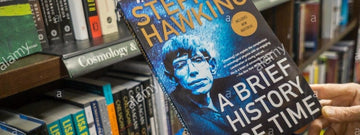
Stephen W. Hawking finally decided to put this life’s worth of groundbreaking research in theoretical physics into a book called "A Brief History of Time" in 1982.
The book's sole purpose is to show people how far we have come into understanding the universe.
You can expect Hawking to talk about Space and Time, Universe and its Meaning, Black Holes, and the Expanding Universe in the book.
But the real question is...
Should I read A Brief History of Time?
"A Brief History of Time" is difficult to understand and only 3% of people finish this book. The language is difficult and most people who aren't associated with physics will struggle to understand it.
Is the language in "A brief history of time" difficult?
The book was made to convey scientifically accurate knowledge without being impenetrable to the general leader.
It welcomes all the beginners who want to learn about the Universe and explore how you can see beyond the theories.
Hawking’s edition is known for explaining the cutting-edge origins and nature of the Universe. Nowadays, this book is available in a variety of languages to help you understand the concept better.
That’s not it; the lack of maths in the text has also made it easier to grab physics without delving much into its complicated math figures.
As for the truth, of the very 100 people who opted for this book, only 3 of them actually ended up reading.
Therefore, after reading the blurb, if you think this book would make it impossible to make it through, you aren’t alone.
However, the people who actually do end up reading take it as a challenge and emerge smart after the completion than they were before.
What you'll learn from this book?
In a nutshell, this book is all about delving deep down to the things you always knew existed but weren’t sure of the purpose and functions.
Stephen Hawking has done an incredible job at explaining complex ideas of physics to the average Joe. This means normal people like you and I can understand how the Universe works.
One of the most impressive takeaways from the book is unveiling the truth about how we are never limited to a particular theory that gives anyone the freedom to come up with revolutionary ideas to change our perceived perspectives.
Besides that, here are a few of the things you will learn from A Brief History Of Time:
1. Theories are Flexible
Just like scientists, toddlers also have the capability to get into the fundamentals and try and test to come up with their own conclusions. Therefore, it is said that the theories we know today are more like educated guesses than facts you can trust blindly.
We are always satisfied with what we have unless we see bigger and better things ahead of us. A common example to showcase a theory is about nothing heavier than air could fly in 1903.
This theory restricted people to innovate, expand, and try out things that they could have done if they knew an object could fly regardless of its weight compared to air.
Therefore, Hawking sets the barriers high by conveying two simple concepts in his book:
● The theory can always be wrong, regardless of how much evidence you have supporting it.
● You can make definite predictions.
2. You don’t fill in the time; it fills you
Many believe that time is something you are on the run to fill it in with stories that will stay with you forever.
However, according to the book, time is indeed tied with the structure of space and the nature of how things work. You don’t wake up in the morning with a blank canvas; it’s all part of your existence, and everything you do is already destined to happen.
3. Time travel is not impossible
Hawking believes time travel is not impossible, but it is doubtful as well.
This is because entropy tends to increase disorder whenever possible. Therefore, to time travel, humans need to be removed from existence first.
Is "A brief history of time" long?
Although the book is 256 pages long, the way Stephan Hawking has broken down such complex topics that can quickly intimidate any general reader into easy-to-read and understand texts makes it effortless to go through all the pages.
How popular is this book?
Stephen Hawking is undeniably the most famous scientist since Albert Einstein. The book seemed to appear from nowhere to make its mark among many science enthusiasts.
After several years of rewrites, "A Brief History of Time" exceeded the expectations and sold out of the United States in a matter of a few days.
After that, you can see the New York Times bestselling book spread like fire and broke the record by being on the Times of London bestsellers list for 237 weeks.
Even now, you can find many people vouching for how easily the book opened up the tangled wires in the brain and made sense of the things that people didn’t know existed.
However, if I have to say if this is the best science book you can count you, then no, it is not. Just like any other science book, this book is also out of date.
In the book, Hawking dealt with concepts regarding cosmic physics 20 years ago. At the same time, the concerns of today are far from lifetime research.
This means you can definitely read the book to understand the fundamentals and learn how science has evolved over the years, and challenge yourself to see the world from others' perspectives rather than blindly believing every word mentioned in the book.
What are similar (and easier) books?
In particular, this book offers excellent value over the others. If you find it hard to see yourself to read a book as complex as A Brief History Of Time, here are a few easier options you can go for.
1. A Short History of Nearly Everything
Bryson never failed to make science fun and entertaining at least once in the book.
He confronts the biggest challenges to understand concepts and questions that have never been answered before. In the book, you can find him question minor yet significant topics from the Big Bang to civilization's rise.
The book goes in-depth with how people and the universe emerge from being nothing to where it is now.
Later, he concluded the book by claiming to be the host of the world’s most advanced and obsessed archeologists, mathematicians, and anthropologists traveling to offices and field camps.
"A Short History Of Nearly Everything" is a profound and funny way to explore the realms of human knowledge and showcasing it as a way to pique your interest with every chapter of the book.
2. Cosmos
This incredible book covers a broad range of concepts ranging from biological, historical, anthropological, cosmological, and astronomical matters to reiterate the development of science and civilization.
The book is mainly a mixture of Sagan’s reflection on science with philosophy.
You can see the author discuss the biographical anecdotes about the many well-known scientists and their contribution to turning this world into today's way.
Unlike the other books mentioned here, Cosmos is packed with 13 heavily illustrated chapters that correspond to the Cosmos TV series. One of the book's most notable topics is how Sana believes in his position on extraterrestrial life.
There is a possibility that there was the existence of alien civilizations by considering the universe's nature. However, no evidence proves such a kind of civilization on earth.
3. Six Easy Pieces: Essentials of Physics By Its Most Brilliant Teacher
"Six Easy Pieces: Essentials of Physics Explained by Its Most Brilliant Teacher" compiles six chapters of physics for people who like to keep things subtle using non-scientific language to make them accessible for all.
You can see Richard P.Feynman’s landmark work in these lectures in Physics is well known to make a pro in Physics with only one big. Yes, you read that right!
The book's content has been extracted from the lectures Nobel Laureate Feynman gave to a group of Caltech undergraduates in 1961 and 1962.
Later, considering the high impact of his lectures, you can also find newly released recordings to help you experience the greatest minds of the Twentieth Century.
As we wrap up the post, you must take away from this one of the most important things. The only way to grow is to ditch your comfort zone and challenge yourself as you reach each obstacle.
If you are an avid reader, go beyond your interests and give books like A Brief History of Time a shot to see whether you can keep up with the discipline to read what’s good for you regardless of how difficult it is. It will open up new doors for you to explore and learn a whole new world.





